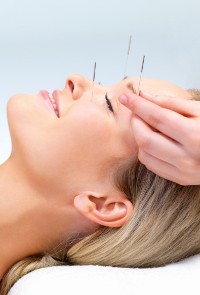A new pilot study finds acupuncture effective in significantly improving eyesight for patients with retinitis pigmentosa (RP). This disorder is a genetically inherited condition that may lead to blindness. Acupuncture improved overall eyesight and improved issues of dark to light adaptation and nyctalopia (night blindness).
Patients received 10 thirty minute acupuncture treatments over a two week period. Acupuncture styles included electroacupuncture, local acupuncture and body-style acupuncture. Local points included acupuncture needles on the forehead and below the eyes.
Testing showed that some of the subjects improved in both eyes after only one week of acupuncture treatment and the results lasted between 10 to 12 months. Dark adaptation increased significantly in the subjects. Night vision and the ability to see in darkened regions improved significantly in subjects. Several other visual field improvements were noted in the subjects including expansion of visibility within are larger visual field. The researchers concluded that acupuncture “entails minimal risk if administered by a well-trained acupuncturist and may have significant, measurable benefits on residual visual function in patients with retinitis pigmentosa, in particular scotopic sensitivity, which had not previously been studied.”
This recent study was published in the prestigious Clinical and Experimental Optometry journal. Treatments for retinitis pigmentosa with acupuncture and herbal medicine have demonstrated positive clinical outcomes in several studies. A groundbreaking study was published in 2011 wherein it was discovered that acupuncture protects the optic nerve from damage caused by intraocular pressure by alleviating stresses on retinal and optic nerve axonal ultrastructures. Another study showed that Chinese medicine improved retinal cone activity for patients with retinitis pigmentosa, even in cases of advanced retinal degeneration. Using electroretinograms for the investigation, the study also concludes that, “TCM (Traditional Chinese Medicine) treatment could also enhance the bioactivity of (the) nerve network and therefore have a definite significance in retarding the progression of disease and keeping the central vision.
A more aggressive study wherein She Xiang was injected into acupuncture points UB18 and UB23 found that acupuncture improved eyesight for patients with retinitis pigmentosa. The study concludes that injection of She Xiang into Ganshu (UB18) and Shenshu (UB23) “can improve effectively the function and metabolism of optic cells, promote blood circulation of the retina, enhance the visual acuity, and protect the central vision for the patient of retinitis pigmentosa.” In yet another study of retinitis pigmentosa, patients receiving acupuncture (ranging from ages 7 – 75 years) showed significant improvement and a halting of deterioration of the visual field.


No comments:
Post a Comment